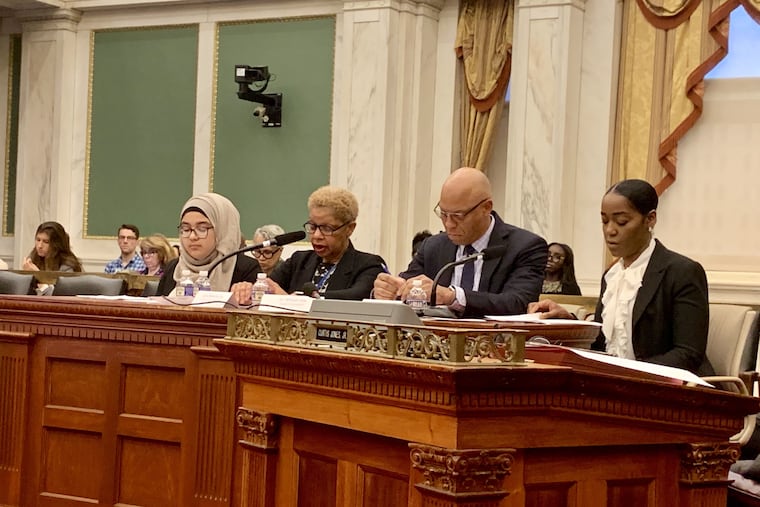Empty buildings, teacher turnover: City Council has questions for Philly schools officials
“Our schools need every dollar that is being proposed in the new budget — and we need more,” Superintendent William R. Hite Jr. said Tuesday.

It was City Council’s turn Tuesday to hear the Philadelphia School District’s annual budget pitch, and as usual, Council members had a long list of questions for Superintendent William R. Hite Jr. and his team.
Hite pointed to his administration’s strong financial record and rising student achievement, saying the $3.4 billion schools budget was a worthy investment. (The Philadelphia school board has no revenue-raising capabilities; it relies largely on city and state funds to run its 220 schools.)
“Our schools need every dollar that is being proposed in the new budget, and we need more,” Hite said.
The local share of the district budget, as proposed in Mayor Jim Kenney’s budget, totals about $1.6 billion, including tax revenue of over $1.3 billion and an increase of the direct city grant to the district by $33 million.
Overall, the tone of the budget hearing was more cordial than in years past, a function of last year’s return to local governance of the school system. But Council still wanted answers on some hot-button issues.
Teacher turnover
Council members quizzed the district on teacher turnover, the subject of a recent Inquirer investigation. According to the newspaper’s analysis, 26 district schools have alarmingly high rates of turnover, affecting some of the city’s most vulnerable children.
Councilman Curtis Jones Jr. noted that many Philadelphia students have instability at home and in their neighborhoods. Stability in principals and teachers is paramount, he said.
“When I wake up and go to school, and they’re not there, that is earth-shaking," said Jones.
Hite said that the district has plans in place to address teacher and principal turnover, and noted that most teachers leave schools because of lack of resources, because they don’t feel supported or have voice, according to exit surveys. He said the district aims to create schools "where individuals feel valued, and that their voices are heard.” The superintendent also said the district it is studying patterns at schools that have high rates of teacher retention and also those that struggle the most.
Building conditions
Hite noted that 32 elementary schools will be certified as lead-safe by the first day of school in September, and 80 more will be assessed and stabilized for lead hazards over the summer. But the district’s capital needs are vast — it would take $4.5 billion to make all necessary repairs and upgrades.
Environmental hazards in city schools were highlighted in an Inquirer investigation.
The superintendent said it would take $75 million to make all schools lead-safe over five years, and an additional $40 million to remove all asbestos over four years. It would take $140 million to upgrade electrical wiring to support modern classroom technology and add air conditioners in 2,000 city classrooms.
Councilwoman Helen Gym, who last week held a separate hearing to organize the community around budget priorities, asked Hite to work with the city on a plan to air condition those and many more. An early start to the school year and a long heat wave prompted multiple school closings last year.
Empty buildings
Councilwoman Cindy Bass questioned Hite on a number of closed schools that now sit vacant and unsold in neighborhoods across the city.
Bass expressed frustration that plans were made for some buildings, like Germantown High, without community input. School board president Joyce Wilkerson said the district was moving toward a model that would allow more time for neighbors to weigh in.
Council had pushed for a quick sale of many of the buildings in 2013 and 2014, when the district was facing a massive budget gap.